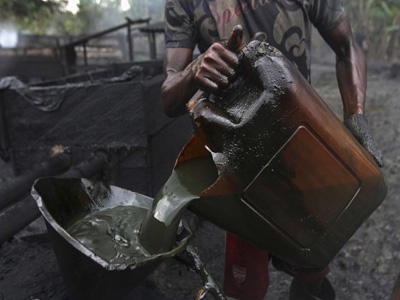By Tife Owolabi
YENAGAO, Nigeria (Reuters) -More than 100 people were killed overnight in an explosion at an illegal oil refining depot on the border of Nigeria’s Rivers and Imo states, a local government official and an environmental group said on Saturday.
“The fire outbreak occurred at an illegal bunkering site and it affected over 100 people who were burnt beyond recognition,” the state commissioner for petroleum resources, Goodluck Opiah, said.
The bunkering site was in the Ohaji-Egbema Local Government Area of Imo state in the Abaezi forest that straddles the border of the two states.
Unemployment and poverty in the oil-producing Niger Delta have made illegal crude refining an attractive business but with deadly consequences. Crude oil is tapped from a web of pipelines owned by major oil companies and refined into products in makeshift tanks.
The hazardous process has led to many fatal accidents and has polluted a region already blighted by oil spills in farmland, creeks and lagoons.
The Youths and Environmental Advocacy Centre said several vehicles that were in a queue to buy illegal fuel were burnt in the explosion.
The border location is a reaction to a recent crackdown by the Rivers state governor on illegal refining in an effort to reduce worsening air pollution.
“The Rivers state governor has made a push recently to stamp out illegal refining in Rivers so it has to move to the fringes and neighbouring states. In the last month or two, there were several raids and some security agents involved were tackled,” Ledum Mitee, former president of the Movement for the Survival of the Ogoni People (MOSOP), said.
At least 25 people, including some children, were killed in an explosion and fire at another illegal refinery in Rivers state in October.
In February, local authorities said they had started a crackdown to try put a stop to the refining of stolen crude, but with little apparent success.
Government officials estimate that Nigeria, Africa’s biggest oil producer and exporter, loses an average of 200,000 barrels per day of oil – more than 10% of production – to those tapping or vandalising pipelines.
That has forced oil companies to regularly declare force majeure on oil and gas exports.
(Courtesy: Reuters. Additional reporting by Julia Payne in Lagos, Writing by Julia Payne and MacDonald Dzirutwe, Editing by Raissa Kasolowsky and Ros Russell)














